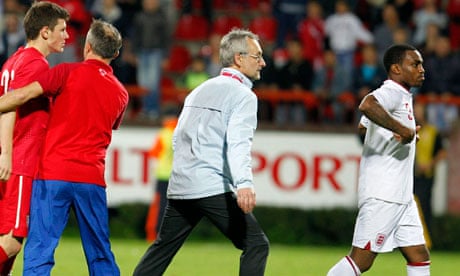Before kick-off in Serbia's World Cup qualifier against Belgium in Belgrade on Friday, three journalists independently told me, with great pride, how promising Serbia's Under-21 side was. The senior side showed potential, the general view went, but in four years or so it would once again be a force to be reckoned with. Two hours later, the limitations of the present senior team had been exposed in a 3-0 defeat while the Under-21s had lost 1-0 to England.
Three days later and Serbian football was once again in disgrace, the senior side beset by internal bickering and the Under-21s' play-off having ended in a brawl as fans hurled missiles on to the pitch and engaged in monkey chants. Even more serious are the allegations of racial abuse against various players. There is frustration and there is anger, but most of all there is despair.
For English football, the disgrace called to mind two previous incidents – Sinisa Mihajlovic's racial abuse of Patrick Vieira in a Champions League game and the chanting directed by Serbian fans at black English players during the European Under-21 championship in Nijmegen in 2007. Mihajlovic, now the national team manager, admitted the offence, apologised publicly and accepted his three-game ban, but asked why Vieira hadn't even been investigated. Mihajlovic insisted he had called Vieira "a black shit" only because Vieira had called him "a gypsy shit": there was a sense of double standards at work.
The Serbian football federation, meanwhile, responded to the 2007 incident by pointing out it had no control over fans in the Netherlands. The game hadn't happened in its stadium, it hadn't sold the tickets and the vast majority of Serbian fans in Nijmegen that night were emigrants living in the Netherlands or Germany.
In both cases, there was a feeling that Serbia was being victimised, that the war and perceptions of what happened in the 1990s made it an easy target. This time, though, there is no excuse. This was an incident that happened in Krusevac and the tickets were sold by the Serbian federation. It has a clear responsibility for what happened: its stewards and its police should have dealt with the crowd trouble and if the allegations against its players are proven, it must take action against them.
With Savo Milosevic, the match delegate, apologising to Stuart Pearce, it seems there is a recognition of the seriousness of the incident, something reflected in the Serbian press. "It's no secret that foreign nationals are often biased against Serbia," said an opinion piece in the tabloid Blic. "It's no secret that they think that Serbia continues in the stone age and that we're thugs, hooligans. It's no secret that the world is circulating the wrong image of Serbia and stereotypes attached to it. But how could it not when the world is being sent the wrong image?"
The problem then is what to do about it. Many in England have called for Serbia to be expelled from European competition. After the hooliganism that forced the abandonment of the Italy v Serbia Euro 2012 qualifier in Genoa, it's easy to understand why. The danger is that doing so pushes Serbian football further into fuck-you isolationism. The truth is that many in Serbian football are appalled by what has happened, about the self-destructiveness that seems to pervade their game at every level, but the statement released on Wednesday by the FSS fails to reflect that.
"The FA of Serbia absolutely refuses and denies that there were any occurrences of racism before and during the match at the stadium in Krusevac," it said. "Making connection between the seen incident – a fight between members of the two teams – and racism has absolutely no ground and we consider it to be a total malevolence." The statement further accuses Danny Rose of having "behaved in inappropriate, unsportsmanlike and vulgar manner towards the supporters on the stands", an extraordinary stance that seems to prejudge the results of its promised investigation and offers little hope it will be either thorough or objective.
The FSS is in a hugely difficult position. The trial in the Hague of the former Bosnian Serb leader Radovan Karadzic for war crimes is a reminder of just how recently Serbia was involved in a horrendous war. Society there is still scarred by those memories; the issue of Kosovo remains unresolved.
Hooliganism, corruption, organised crime and match-fixing haunt Serbian football and the FSS is largely impotent to combat them.
Of course the FSS must take action. It must ban any Serbian player found guilty of racist abuse (four to eight games seems the standard penalty), it must make clear that racism is intolerable, it must investigate the crowd trouble and prosecute where appropriate. It must not be too proud to ask for help, but the wider world has to make clear it is willing to listen. A ban should be a last resort. The urge to punish is understandable but it must be the guilty who are punished.
If the FSS refuses to act decisively, refuses to recognise the severity of the allegations, refuses to do what it can within its admitted limited power, it becomes complicit. And if that is the case, then a points deduction or a ban may be the only solution left.

